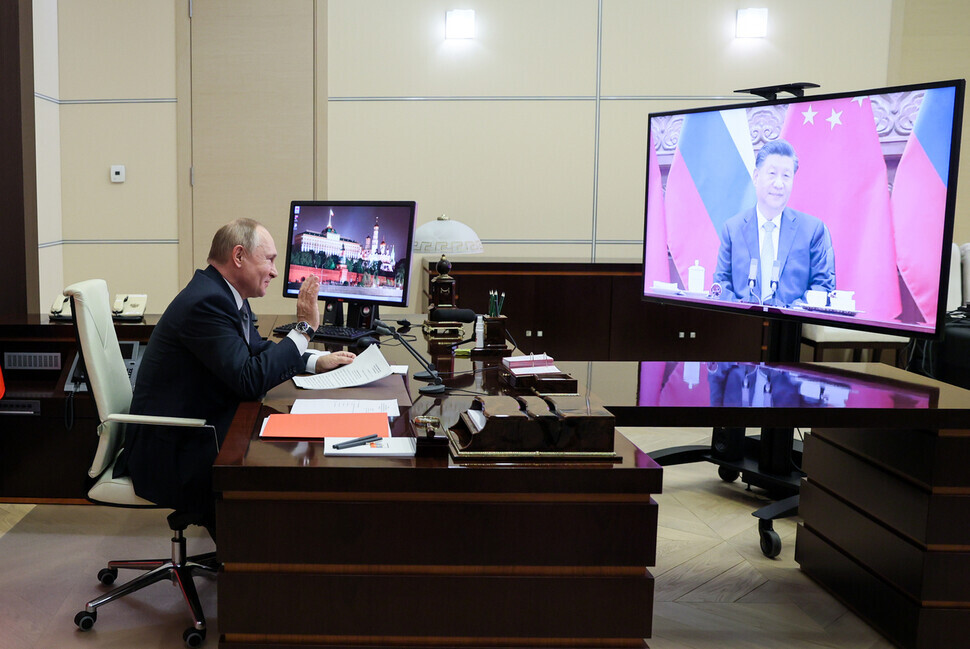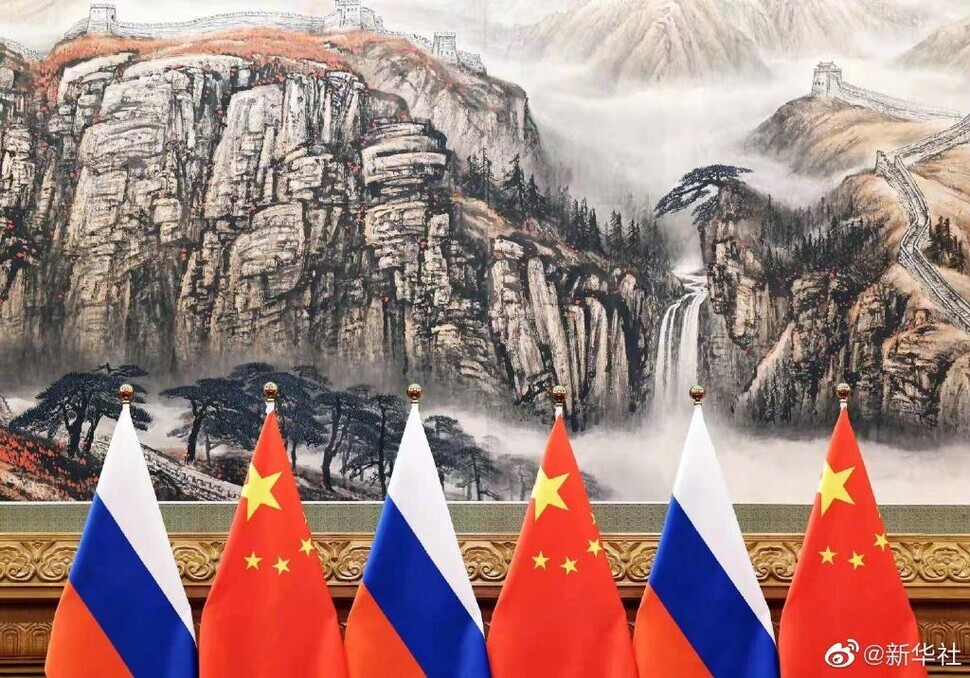hankyoreh
Links to other country sites 다른 나라 사이트 링크
Is the China-Russia summit a sign of ramped-up cooperation against the US?

The video summit between Chinese President Xi Jinping and Russian President Vladimir Putin on Wednesday afternoon kicked off warmly with an exchange of compliments. Putin praised the relationship between the two countries as a “model of cooperation” in the 21st century, while Xi thanked Russia for its support for China’s efforts to uphold “key interests.”
Meeting shortly after the US targeted both countries with its Summit for Democracy on Dec. 9–10, the two leaders appear to have explored possible responses and ideas for cooperation against the US on the “two front lines” of Taiwan and Ukraine during their summit that day.
According to reports by China’s state-run Xinhua news agency and other foreign news outlets, Xi and Putin demonstrated their closeness by exchanging waves as the summit began on Wednesday afternoon.
In his opening remarks, Xi noted that “China-Russia relations have withstood the trials” of the turbulent times and demonstrated “new vitality.” Putin stated the two sides had “created a new model of cooperation where we respect one another’s interests without interfering in each other’s internal affairs.”
Putin also noted that China and Russia “invariably support each other on issues of international sports cooperation, including rejection of any attempts to politicize sports and the Olympic movement.” He went on to declare plans to meet with Xi before attending the opening ceremony of the Winter Olympics in Beijing.

Their summit Wednesday drew particular attention for coming so soon after the US-China summit on Nov. 15 and the US-Russia summit on Dec. 7.
With China’s rise entering full swing in the mid-2010s and the Ukraine situation erupting in 2014, China and Russia have shown solidarity against the US whenever key issues have arisen. In a June 2019 summit, they exchanged opinions and explored a joint response to the US withdrawal from the Iran nuclear deal; in a late August 2021 conference call, they did the same for the US withdrawal from Afghanistan.
During their latest summit, they appear to have exchanged views on a wide range of areas including their response to the Summit for Democracy, the situation in Ukraine — which has sparked rumors of war erupting early next year — and the Taiwan issue, which China views as a “key interest.”
Indeed, Xi decried “certain international forces” that “under the guise of ‘democracy’ and ‘human rights’ are interfering in the internal affairs of China and Russia, and brutally trampling on international law and recognized norms of international relations.”
Xinhua quoted Xi as saying, “efforts must be made to firmly reject hegemonic acts and the Cold War mentality under the disguise of ‘multilateralism’ and ‘rules.’”
Putin expressed Russia’s “staunch support for China’s legitimate position on Taiwan-related issues,” adding that it would “firmly oppose any force using the Taiwan issue as an excuse to harm China’s interests.”
He went on to say, “I resolutely oppose the forming of any ‘small fences’ in the Asia-Pacific region and hope to increase communication with China to protect the true democratic rights of our countries.”
The question on observers’ minds is whether China and Russia reached any concrete agreement on their plans for coordinating against the US.
Shortly after the US and NATO held their Global Thunder strategic weapons exercise, China and Russia held a defense ministers’ meeting via videoconference on Nov. 23, where they reached an agreement to step up their military cooperation. This led some analysts to observe that the two countries were “approaching a military alliance.”
In 2001, China and Russia concluded their Treaty of Good-Neighborliness and Friendly Cooperation, which they renewed when it marked its 20th anniversary last June. At present, they are not allies bound by mutual defense obligations.
By Jung In-hwan, Beijing correspondent
Please direct questions or comments to [english@hani.co.kr]

Editorial・opinion
![[Correspondent’s column] The real reason the US is worried about Chinese ‘overcapacity’ [Correspondent’s column] The real reason the US is worried about Chinese ‘overcapacity’](https://flexible.img.hani.co.kr/flexible/normal/500/300/imgdb/original/2024/0510/5217153290112576.jpg) [Correspondent’s column] The real reason the US is worried about Chinese ‘overcapacity’
[Correspondent’s column] The real reason the US is worried about Chinese ‘overcapacity’![[Editorial] Yoon’s gesture at communication only highlights his reluctance to change [Editorial] Yoon’s gesture at communication only highlights his reluctance to change](https://flexible.img.hani.co.kr/flexible/normal/500/300/imgdb/original/2024/0510/7717153284590168.jpg) [Editorial] Yoon’s gesture at communication only highlights his reluctance to change
[Editorial] Yoon’s gesture at communication only highlights his reluctance to change- [Editorial] Perilous stakes of Trump’s rhetoric around US troop pullout from Korea
- [Guest essay] Preventing Korean Peninsula from becoming front line of new cold war
- [Column] The state is back — but is it in business?
- [Column] Life on our Trisolaris
- [Editorial] Penalties for airing allegations against Korea’s first lady endanger free press
- [Editorial] Yoon must halt procurement of SM-3 interceptor missiles
- [Guest essay] Maybe Korea’s rapid population decline is an opportunity, not a crisis
- [Column] Can Yoon steer diplomacy with Russia, China back on track?
Most viewed articles
- 1[Correspondent’s column] The real reason the US is worried about Chinese ‘overcapacity’
- 2S. Korea “monitoring developments” after report of secret Chinese police station in Seoul
- 3Nuclear South Korea? The hidden implication of hints at US troop withdrawal
- 4[Editorial] Yoon’s gesture at communication only highlights his reluctance to change
- 5Yoon voices ‘trust’ in Japanese counterpart, says alliance with US won’t change
- 6No good, very bad game for Korea puts it out of Olympics for first time since 1988
- 7Presidential office warns of veto in response to opposition passing special counsel probe act
- 8Smartphones have been shown to hurt brain development — can Korean kids kick the habit?
- 9‘We must say no’: Seoul defense chief on Korean, USFK involvement in hypothetical Taiwan crisis
- 10Korea poised to overtake Taiwan as world’s No. 2 chip producer by 2032